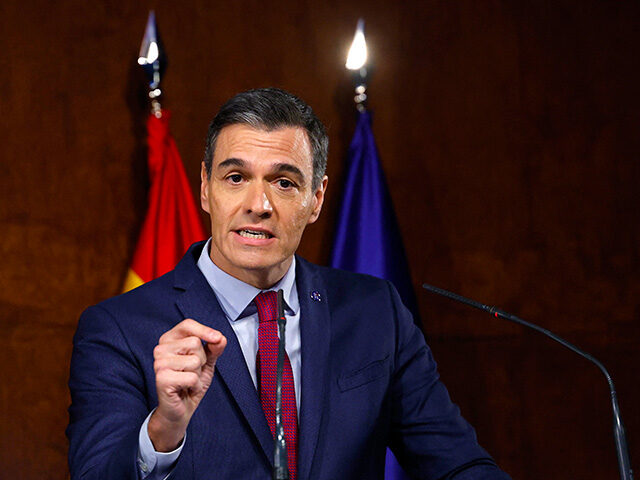The government of Spain announced on Monday that it is planning to urge the European Union to lift sanctions on socialist Venezuela during the next EU ministerial meeting, a response to leftist American President Joe Biden doing the same.
The Biden administration announced last week it would lift all oil and gas sanctions on the repressive dictatorship of socialist Nicolás Maduro, allowing Petróleos de Venezuela (PDVSA), the state oil company, to openly trade on the global market. The move will give Maduro the opportunity to pour Venezuelan oil into American markets, competing with domestic producers, and create a potential revenue stream for Maduro’s Islamist allies, including the Iranian terrorist regime and proxies such as the genocidal group Hamas.
Iran recently signed an agreement with Maduro’s regime and mutual ally Bashar Assad, the dictator of Syria, to build a new oil refinery in the Syrian city of Homs; Iran has also signed agreements to help PDVSA rehabilitate its derelict oil refineries, likely profiting both Iran and Venezuela.
Iran is the world’s premier state sponsor of terrorism, funding groups such as Hamas, the Shiite groups Hezbollah and the Yemeni Houthi movement, Palestinian Islamic Jihad, and similar outfits for decades. The U.S. State Department estimated in 2020 that Iran provides Hamas, which controls the Gaza territory, and Palestinian Islamic Jihad $100 million a year.
In addition to its ties to Iran, the Venezuelan regime has actively supported Hamas in the aftermath of the October 7 massacre of over 1,400 Israeli civilians, many of them in their homes during door-to-door assaults. Maduro’s regime defended the mass murder in a statement shortly after, condemning Israel in alleged defense of the “Palestinian people.”
Spanish Foreign Minister José Manuel Albares did not address the link between the Venezuelan socialist regime and nefarious actors in the Middle East during his remarks on Monday, in which he said that he had told fellow European Union ministers that Spain supports lifting sanctions on Caracas.
“I have addressed my colleagues to raise the necessity of studying the revision of EU sanctions on Venezuela,” the Spanish news agency EFE quoted Albares as saying, “in line with the recent decisions by the United States and the positive evolution in the dialogue among Venezuelans.”
Albares made the remarks following a meeting of EU foreign ministers in Luxembourg. He said that EU foreign policy chief Josep Borrell appeared interested in the idea but that it would have to wait until the next EU ministerial meeting, scheduled for November 13. Current EU sanctions on Venezuela expire on November 14.
The European Union sanctions are far less expansive than those that Biden lifted on the Maduro regime. The EU agreed, in 2017, to halt weapons sales to Maduro in an attempt to prevent his forces from raping, torturing, and killing political dissidents, as Maduro’s Bolivarian National Guard (GNB) did for years with few consequences. The EU also published a list of high-ranking Maduro regime henchmen whom it banned from entering EU territory.
“This is why some critics believe that the lifting of these measures will not have any impact, as they didn’t have any while they were in vigor in Venezuela, either,” the Spanish newspaper El Mundo observed.
Biden’s lifting of sanctions on PDVSA and several other lucrative measures for Maduro was the result of ongoing negotiations in Barbados between the Maduro regime and the socialist-left establishment “opposition,” which has demanded participation in a presidential election. Maduro has routinely staged sham “elections” in Venezuela against opposition figures for over a decade, most recently in May 2018, when Maduro declared himself “president” in an election with record-low turnout in which all non-socialist and communist candidates were banned. That election led the opposition in the National Assembly to use its constitutional powers to appoint an “interim” president, Juan Guaidó, who was legally president of Venezuela through 2022 and is now a refugee in the United States following a National Assembly vote to depose him.
In exchange for the sanctions relief, the U.S. government claimed that Maduro agreed to host “free and fair” elections in 2024, develop a “timeline” for releasing political prisoners and allowing banned presidential candidates on the ballot, and respect “the right of all political parties to choose their candidate for the presidential elections in a free way according to their internal mechanisms.”
Maduro has yet to free more than six of the upwards of 200 political prisoners known to languish in Venezuelan prisons and has not offered any guarantees that the 2024 election would happen. He has also already violated his promise to respect opposition primaries, threatening to arrest those participating in a nationwide opposition primary on Sunday. The winning candidate, lawmaker María Corina Machado, is banned from holding office through 2030 for her calls to restore democracy in her country.
While the U.S. has forced Maduro to make promises he has yet to keep, the Spanish government has not publicly addressed similar issues directly affecting its citizens. El Mundo noted Monday that at least four Spanish nationals are being held as political prisoners in Venezuela, an issue Albares gave no indication Madrid had raised with Caracas. Spain — unlike several European countries including Norway, France, and the Netherlands — was not part of the negotiations in Barbados, so it had no say in those discussions.

COMMENTS
Please let us know if you're having issues with commenting.